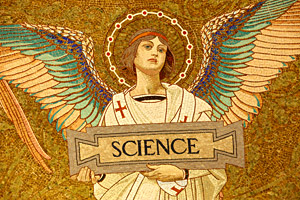
America has the luxury of being able to dash from one culture war to another, primarily because we are a wealthy country with plenty of food and medicine and energy, providing ample opportunity for people who have never lacked for any of those to be opposed to science related to food, medicine and energy, while others can claim pollution is our friend or worry about abstract ideas like the conflict between science and religion.
You would never know we are not doomed by this looming science/religion conflict if you read science and political media over the last decade or two - a chunk of science media thinks that if some rogue school district tries to present a zany alternative to evolution we will become a third world nation while some in religion think scientists are amoral activists ruining Western civilization with in vitro fertilization.
Rice sociologist Elaine Howard Ecklund discussed findings from the "Religious Understandings of Science (RUS)" project recently, with a focus on evangelicals. RUS is a mixed-method compilation of survey, observation, document analysis and interviews and when you have a survey of 10,000 Americans and then 300 interviews, 140 of which were evangelical Christians, it is going to be skewed, thus some of the results pertain mostly to evangelicals but since they often get magnified in stories about anti-science religious people, it makes sense to provide a little more balance.
It can also make other findings look a little strange when the data is mixed in with those that are more representative. If we survey Whole Foods shoppers in Marin County about genetically modified foods or vaccines and then the rest of the local population on something else, Marin county would seem disconnected scientifically if we only mentioned those two.
So 69 percent of evangelicals are fine with science but then for Americans overall that number is 73, which is really low compared to other surveys. Then we get the result that 76 percent of scientists identify with a religious tradition.
Given all that mixing and matching, some context is important. Having suffered through a decade of "framing" of the conflict between science and religion by partisan spin-meisters, you might think evolution is a deal breaker, but in reality only 15 percent of Americans are creationists. Since 25 percent of the public has been convinced gluten is bad for them and 74 percent of one school in Marin county denies vaccines, 15 percent of people thinking evolution did not happen is pretty darn good by comparison. Young Earth people can at least claim Kepler for their side, while all the anti-gluten people have is that some guy said so in a book.
Is it possible that evangelicals are twice as likely to regard science as in conflict as the rest of the country? Well, sure, but matching them up against Muslims and Hindus is not telling an accurate story either. The number of native-born people who adopt Islam and Hindu-ism is tiny, instead most of them moved here and they are overwhelmingly educated. Comparing their beliefs about science to native-born people without controlling for educational background creates a false metric. A Christian scientist or engineer who moves to India would have a much different opinion than a bus driver about whether or not a rape victim was asking for it because she was out at 9 PM, and so a sociologist couldn't legitimately claim that Christianity was better than Hinduism using that comparison.
Most of the public does not think there is any conflict between science and religion. Even evangelicals, the least scientific group in Christianity, overwhelmingly see no issue between them. So if you do, you need to take a long look at whether you are really a fan of one or just hate the other and are using belief as an intellectual beard.
Top image credit: James Ph. Kotsybar




Comments